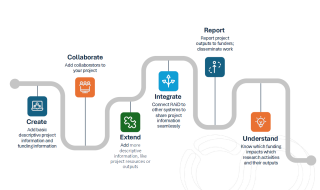Research Activity Identifier (RAiD)
What is RAiD
RAiD connects research-related activities, resources, funding, and contributors by consolidating multiple PID's into a single envelope, together with descriptive metadata that provide context and enriching information for the recorded PID’s. Additionally, a RAiD record contains fields for information governance: RAiD's can be linked to one-another as related RAiD’s (think of two projects connected to the same research programme), and provenance information can be recorded, to track changes to RAiD's over time as projects evolve.
RAiD provides persistent, unique and resolvable information for research projects, improving information management. Additionally, by helping to maintain consistent and up-to-date information on projects throughout the research lifecycle, RAiD will improve open science practices.
The aim of RAiD is to become a single source of truth for research projects.

Figure 1: RAiD journey in context
In Fig. 1, we show how RAiD is a record that lives throughout the research lifecycle, and how different actors can interact with the system at different stages.
When a project is ideated or started, the PI will create the RAiD with an initial set of descriptive metadata. Then, they will invite collaborators to work on the project and they will extend the metadata of the RAiD with their knowledge and material.
The information will be transmitted to other systems that RAiD can be integrated with, allowing for research administrators to easily report on project activities. The information gathered in a RAiD will finally allow funders to better understand the impact of the research project.
RAiD has been developed by the Australian Research Data Commons and it is brought at SURF within the FAIRCORE4EOSC collaboration, which is a EU-funded project focused on the development of core components for the European Open Science Cloud (EOSC) in accordance with the FAIR principles (Findability, Accessibility, Interoperability, Reusability), with RAiD being one of said core components.
RAiD is currently in development at SURF as “EOSC RAiD”, with the plan to launch the service after summer 2025. We are currently piloting the service with selected institutes and case studies at the national level to understand how to tailor the service to the local context.
Use Cases
The RAiD service suits sectors which manage or conduct research and provides an array of benefits to researchers and research administrators such as:
- reducing the administrative workload for information gathering and reporting;
- providing a solid schema for an information management model;
- increasing transparency over funding and resource usage;
- facilitating the understanding of the impact of research.
To better understand the potential usage and impact of RAiD, we will illustrate some use cases for which RAiD represents an optimal solution:
- A Research Administrator will want RAiDs to act as a single source of truth about research projects to coordinate funding, reporting and other activities across the organization. This must be done in a way that is easy and fast to use, can be integrated with their Current Research Information System (CRIS) and finance software, can easily have its data harvested, connected, aggregated and analyzed, can maintain appropriate access embargos, and represent hierarchical relationships between research activities.
- Research Support Professionals will want an information record (the RAiD) for research projects that can provide a single source of truth about the project - including historical information - across an array of services like their organization’s CRIS.
The method to do so must be easy to use and integrate with other metadata services to automatically and consistently populate information already in the RAiD into derivative metadata entries.
RAiDs not under embargo must also be easily searchable so that Researchers and Research Support Professionals are able to find similar projects to promote collaboration and knowledge exchange.
- The National Research Funder or Private Funder will want RAiDs to provide a single source of truth about research projects funded by their grants that sync with other platforms as information is added and can be used to track downstream outcomes and the long term impact of the grants.
Expression of interest
EOSC RAiD is not available as a service yet, but we are welcoming expressions of interest in the service to facilitate adoption at the national level. Like with any Persistent Identifier service, RAiD will thrive when the adoption will be large. Leave your details in the form below if you're interested in the RAiD service.